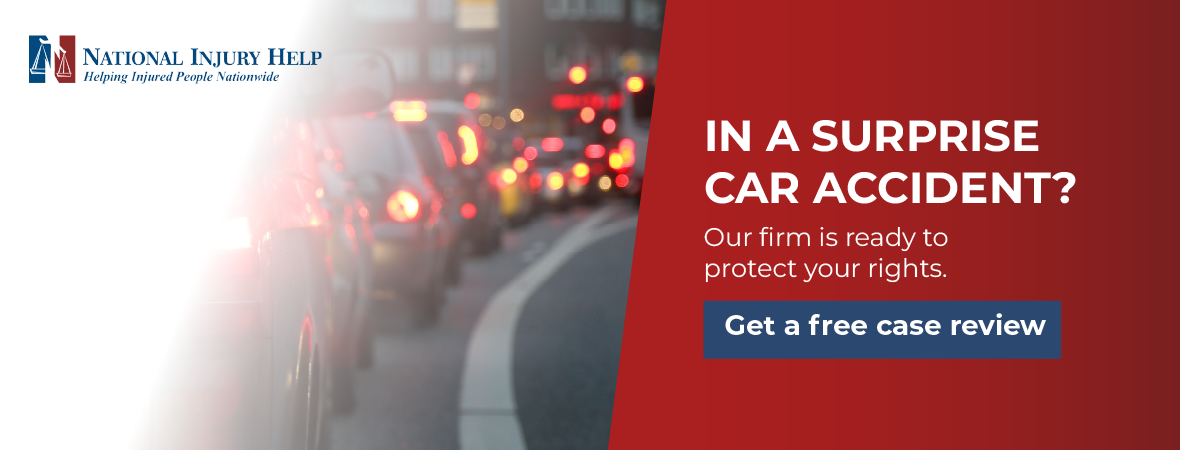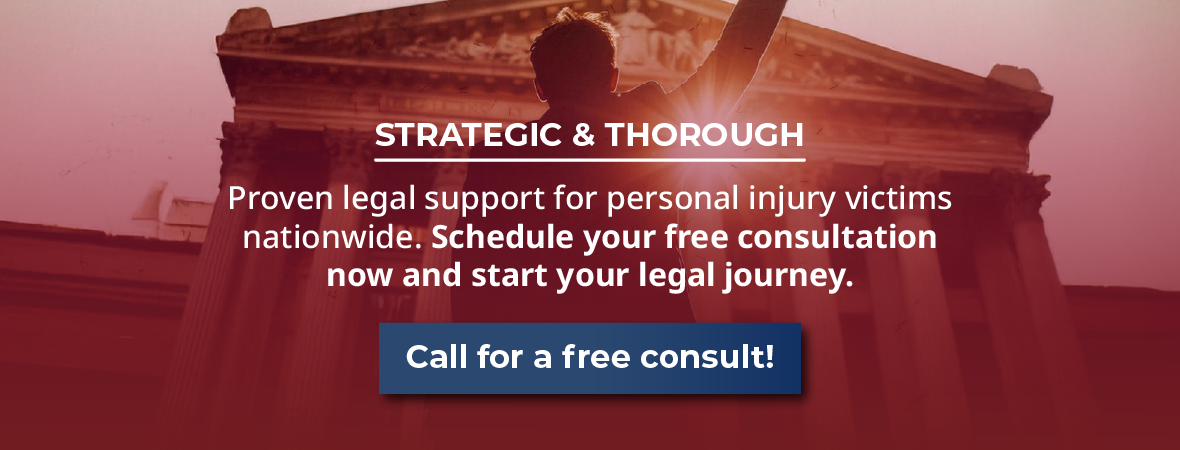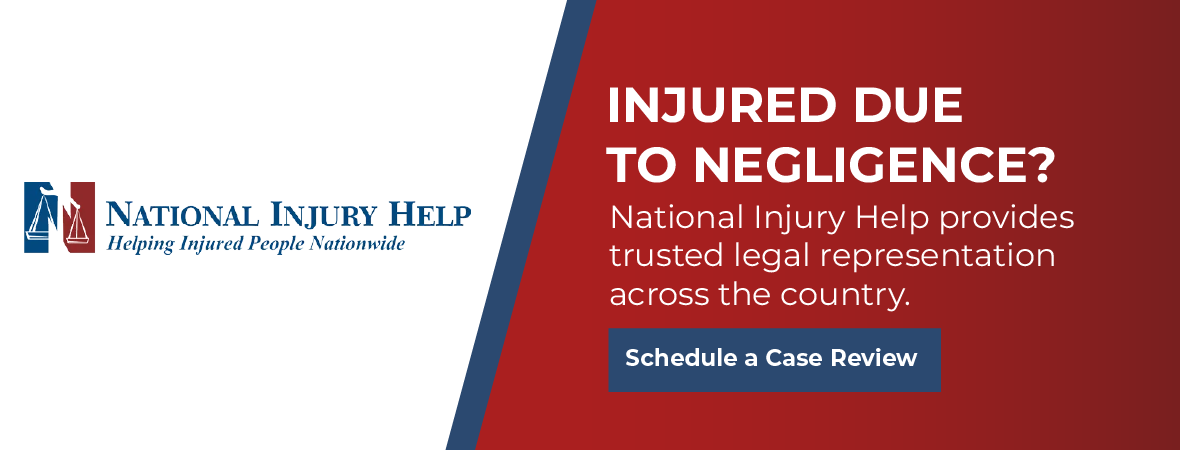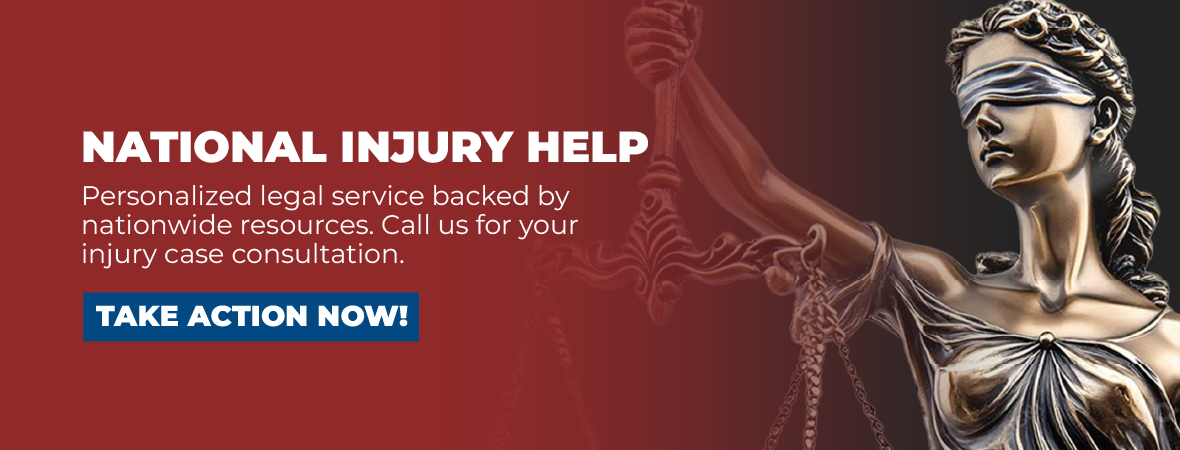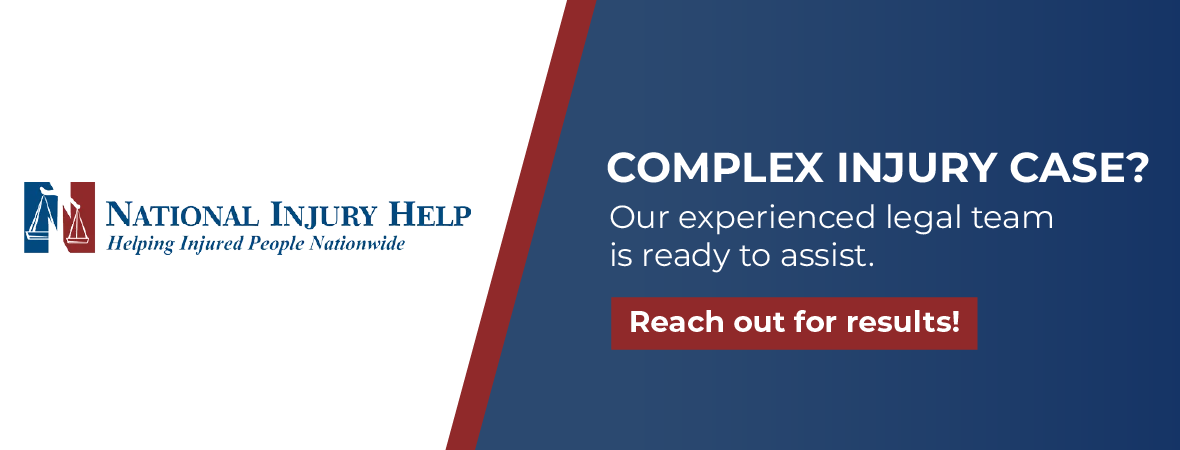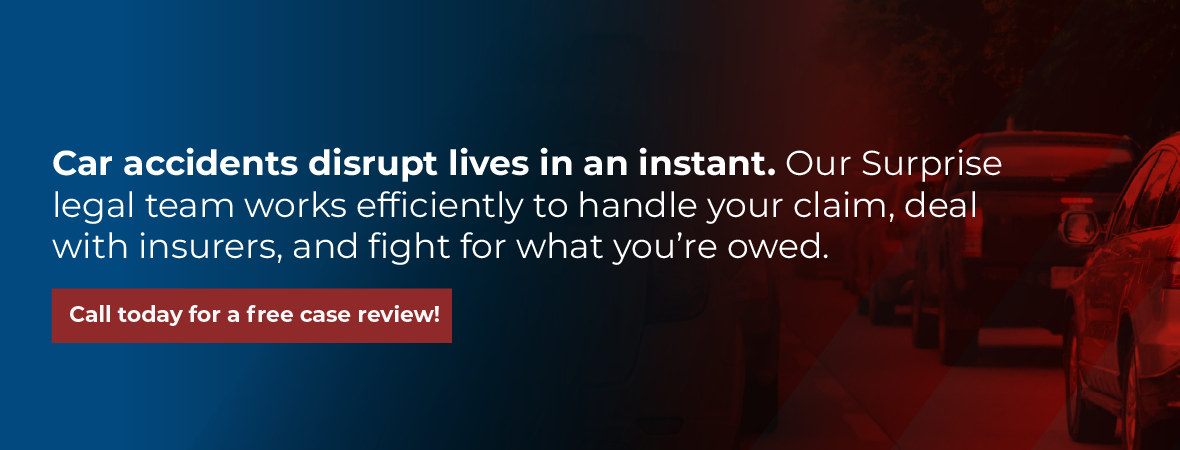A car accident in Surprise can leave you with injuries, stress, and costly repairs. Contact National Injury Help at 1 (800) 214-1010 today. We are here to protect your rights and guide you every step of the way.
Every day, thousands of vehicles move along Bell Road, Grand Avenue, Greenway Road, and Loop 303. Most trips finish without trouble, yet all it takes is one distracted glance or one sudden dust storm to send two cars into a violent collision. In those first anxious minutes on the shoulder, you worry about your passengers, but within hours, new worries emerge. Ambulance fees arrive.
Emergency doctors order CT scans. Your boss asks when you will return, even though the whiplash keeps you awake at night. Insurance adjusters leave voicemail messages that sound friendly yet feel oddly rushed.
Arizona drivers must carry insurance, but carriers often use delay tactics, partial fault claims, or confusing policy language to limit payments. When you try to manage medical appointments and rental-car charges at the same time, one missed deadline can sink a valid claim. Working with a Surprise car accident lawyer removes that pressure.
A lawyer gathers evidence from police records, traffic cameras, and eyewitness accounts while you rest and heal. A lawyer also handles every phone call with carriers, so adjusters cannot twist an off-hand remark into an excuse for a low offer.
Common Causes of Car Accidents in Surprise, AZ
Every collision has a story, yet most stories share familiar themes of distraction, speed, or poor decision-making. Identifying the primary cause helps your attorney prove liability.
Distracted Driving
Smartphones sit within reach of every steering wheel. A driver checks a text at a green light, then rolls forward while reading a reply. A sales rep balances a coffee cup, a GPS map, and a Bluetooth call. Even hands-free devices still steal attention, and attention is what prevents wrecks.
On Bell Road, the traffic lights change fast, and the few seconds lost while scrolling a playlist can be the same few seconds needed to brake for a turning car.
Speeding and Aggressive Driving
Grand Avenue and Greenway Road invite higher speeds because long straight stretches feel safe, but Surprise police records show many rear-end and side-impact crashes start with just ten miles per hour above the limit.
Drivers who weave through traffic to shave minutes off a commute misjudge gaps, startle cautious drivers, and spark chain reactions. Loop 303 interchanges intensify these dangers when merging lanes narrow and drivers vie for position at highway speeds.
Driving Under the Influence
Arizona enforces strict DUI laws, yet officers still arrest impaired drivers every weekend. Alcohol slows reflexes, marijuana distorts depth perception, and certain prescription drugs cause drowsiness or delayed reaction times.
Late-night traffic near restaurants on Bell Road and club areas in neighboring cities sends intoxicated drivers southbound through Surprise streets, where families return from ball games or late movie showings.
Failing to Yield or Running Red Lights
Intersections are conflict points where mistakes turn lethal. Yellow lights encourage a last-second push across Grand Avenue, but cross traffic may already hold a green arrow by the time the speeding car enters.
Drivers heading east on Greenway often misread protected left signals and strike vehicles traveling west. Pedestrians face similar risks at mid-block crossings where drivers focus on other cars and overlook slower foot traffic.
Weather-Related Crashes
Most days in Surprise bring clear skies, yet seasonal rain and dust storms appear without warning. Monsoon downpours reduce tire grip, and standing water causes hydroplaning on Bell Road dips.
Dust storms drop visibility to a few yards on Loop 303, leading drivers to brake hard while vehicles behind continue at highway speed. Even light rain lifts oil residue on asphalt, turning a gentle curve into an unexpected slide.
Arizona Car Accident Laws That Could Affect Your Claim
State statutes dictate how fault is assessed, how long you have to sue, and how much insurance every driver must carry. A clear view of these rules keeps your claim on the right schedule.
At-Fault Insurance System
Arizona follows a fault-based or tort model. The driver who causes the crash must pay for injuries and vehicle damage.
You file a claim with that driver’s carrier, with your own carrier under certain coverage, or you file a lawsuit. Proof of negligence matters because the responsible insurer will not pay until fault is established.
Comparative Negligence Rules
Sometimes fault is shared. Maybe you drove a few miles per hour over the limit or glanced at the radio just as the other driver ran a red light. Arizona uses pure comparative negligence. If you are thirty percent at fault, your total recovery drops by thirty percent.
Even if you share more than half the blame, you can still collect the remaining percentage. Evidence that reduces your share of fault raises your final payout.
Statute of Limitations
You have two years from the date of the crash to file a personal injury lawsuit or a property damage lawsuit. Miss the deadline, and the court will almost always dismiss the case, no matter how strong your facts are. Gathering medical records, police reports, and expert opinions takes months, so early legal action is essential.
Minimum Insurance Requirements in Arizona
Drivers must carry at least twenty-five thousand dollars for bodily injury per person, fifty thousand per accident total, and fifteen thousand for property damage.
Severe injuries can push hospital bills past these limits within hours. Underinsured motorist claims or third-party defendants may fill the gap, but that process requires experienced negotiation.
When Police Must Be Called
Arizona law says you must notify police when someone is hurt, when a death occurs, or when damage appears to exceed one thousand dollars. Officers create an official crash report, record statements, and note any traffic citations. This report anchors your legal position. If police do not respond, you must still file a report within the required period.
What to Do After a Car Accident in Surprise
The minutes after impact feel chaotic, but clear steps protect your body, preserve evidence, and strengthen your claim.
Move to Safety and Call 911
If cars can roll, steer to a shoulder or a nearby lot. Turn on hazard lights. Dial 911 and describe injuries so dispatchers can send the right number of ambulances and officers. Stay calm when speaking because the audio may become evidence later.
Collect Driver and Witness Information
Exchange names, driver’s license numbers, plate numbers, and insurance details with every involved driver. Ask bystanders for contact information in case they leave before officers arrive. Independent witnesses often break a he-said-she-said stalemate between drivers.
Take Photos and Record Evidence
Use your phone to capture wide shots of vehicle positions, close shots of damage, skid marks, shattered glass, and traffic signals. Include timestamped pictures of your injuries and anyone else hurt. Video clips help show weather conditions and traffic flow.
Seek Medical Attention Even If You Feel Fine
Adrenaline masks pain. Concussions, internal bleeding, and soft tissue tears may not appear until hours later. Visit an emergency room or urgent care as soon as possible. The record of early treatment ties injuries directly to the crash.
Don’t Talk to Insurance Before Consulting an Attorney
Adjusters ask recorded questions designed to limit payouts. A polite statement that you prefer to speak after consulting counsel is enough. Provide only basic facts required by your own policy, such as time, location, and vehicle description.
Common Injuries in Car Crashes
Here are some of the most common injuries that occur during car accidents in Surprise, AZ.
Whiplash and Soft Tissue Damage
When a vehicle stops suddenly, the body’s inertia causes the head and neck to snap backward and forward. This rapid motion strains muscles, ligaments, and tendons along the spinal column. The result often shows up as neck pain, tightness between the shoulder blades, headaches, and stiffness.
Symptoms can start with mild stiffness but may intensify over hours or days. A dull ache in the neck or shoulders becomes sharper when turning, bending over, or lifting. Because soft tissue injuries do not show up on X-rays or CT scans, they are harder to validate. Instead, doctors diagnose whiplash based on physical symptoms, range-of-motion testing, and ruling out fractures.
Treatment typically starts with R.I.C.E. therapy: rest, ice, compression, and elevation. Anti-inflammatory drugs and muscle relaxants help. Physical therapy encourages healing by guiding safe stretching and strengthening over weeks or months. Some patients respond well and make full recoveries, while others experience chronic pain unless therapy continues for several months.
Insurers often resist paying for whiplash claims unless doctors carefully document progress and restrictions. A well-supported injury report increases the chance of fair compensation covering medical costs and lost income.
Broken Bones and Fractures
Even with seat belts and airbags in use, fractures are common. Drivers may suffer rib fractures from seat belts, forearm breaks from bracing during impact, or hip fractures when the pelvis hits the steering column. Passengers may break their clavicles or suffer leg fractures on dashboard impact.
Types of Fractures
- Simple fracture: clean break, bones remain aligned
- Comminuted fracture: bone shatters into multiple pieces
- Compound fracture: bone pierces the skin
- Greenstick or spiral fractures: common in younger patients
Mild fractures may require just casting. Complex breaks call for orthopedic surgery with pins, plates, or rods. Healing time varies widely, from six weeks for a simple arm fracture to several months for more complex breaks.
Even after healing, long-term therapy may be needed to restore strength and flexibility. Broken ribs can hinder breathing, leading to lung complications if not treated properly. Return to work or driving delays can strain finances.
Medical records showing follow-up X-rays, rehab notes, and detailed recovery progress make fracture claims harder to challenge. They help prove both economic damages (medical bills, lost wages) and non-economic damages (pain, suffering).
Traumatic Brain Injuries (TBI)
Brain injuries occur when the brain accelerates or decelerates quickly against the skull, like during a rear-end or rollover crash. Even without direct impact to the head, the brain can twist and tug, causing concussions or more severe damage.
Levels of Brain Injury
- Concussion or mild TBI: headaches, memory fog, mood changes
- Moderate TBI: longer unconscious periods, confusion, physical weakness
- Severe TBI: seizures, skull fractures, prolonged coma or vegetative state
Physical signs include headaches, dizziness, tinnitus, and light or sound sensitivity. Cognitive symptoms may include memory issues, slowed thinking, confusion, or trouble focusing. Emotional signs often include irritability, depression, anxiety, or sudden emotional outbursts.
CT scans and MRIs identify bleeding, swelling, contusions, or skull fractures. Doctors must also track delayed symptoms. A victim who appears alert at the scene may deteriorate hours later as brain swelling begins.
Immediate care might include hospital observation, surgery to relieve intracranial pressure, and medication. Recovery often involves physical therapy, occupational therapy, speech therapy, and cognitive rehabilitation. The full recovery timeframe depends on severity and can range from weeks to years.
Even moderate TBIs can reduce the ability to work in cognitively challenging jobs. Patients may need memory aids, behavior management, or supervised care for years. These long-term needs must be part of any compensation demand.
Spinal Injuries and Paralysis
Crashes often cause neck compression or twisting that affects discs and vertebrae. Herniation, slipped discs, or fractures may result. Severe trauma can crush vertebrae or tear the spinal cord.
Effects of Injury
- Pinched nerves cause radiating pain, numbness, tingling, or weakness in the arms or legs.
- Paralysis results when spinal cord damage cuts off motor or sensory signals. It can be paraplegia (lower body) or quadriplegia (arms and legs lost).
- Spinal instability may require surgery, fusion, or long-term bracing.
Treatments can include traction, spinal fusion surgery, or discectomy. Rehabilitation may involve physical therapy for strength, gait training, and adaptive technology. Chronic pain and mobility aids may be necessary.
Spinal injuries often require home modifications, long-term physical therapy, personal care, and wheelchair-accessible vehicles. This lifelong cost must be accounted for in claims.
Emotional and Psychological Trauma
Many insurers minimize emotional claims because there is no external wound. Arizona law, like most states, recognizes emotional trauma as part of a valid injury claim, especially when verified by mental-health professionals. Common aftereffects include:
- Post-Traumatic Stress Disorder (PTSD): recurring flashbacks, avoidance, hypervigilance
- Panic or anxiety attacks, especially behind the wheel
- Depression or changes in mood, loss of interest, or isolation
- Sleep disturbances, nightmares, or difficulty concentrating
Mental health records, therapy attendance logs, and statements from loved ones help quantify emotional damages. Journaling daily struggles also provides supporting evidence to recognize the psychological impact.
Delayed medical attention can weaken a case. Insurance companies often argue that older injuries predated the crash. Going to an ER or urgent care quickly creates a clear link between the accident and the symptoms, making compensation claims more credible.
How a Surprise Car Accident Lawyer Can Help You
Experiencing a car crash is stressful, painful, and overwhelming. You deal with recovery, medical bills, insurance calls, lost income, and the emotional fallout.
Having a qualified attorney by your side turns scattered evidence into a cohesive claim and protects you from tactics designed to wear you down. Here’s an in-depth look at how a Surprise car accident lawyer helps you recover fairly.
1. Launch a Thorough Investigation
Building a strong case starts with evidence, and that evidence must be gathered quickly.
- Police Reports and Officer Interviews: Your lawyer requests and closely reviews the official crash report. They may follow up with the investigating officer to clarify diagrams, citations, or statements.
- Eyewitness Statements: Memories fade fast. Attorneys re-interview witnesses soon after the crash to capture accurate accounts. Written or recorded statements strengthen your case.
- Traffic and Surveillance Video: Lawyers request footage from traffic cameras, nearby businesses, and home or security systems to ensure key evidence isn’t erased or lost.
- Dashcam Recordings: If other drivers involved or bystanders were recording, your attorney gathers those videos to reconstruct events.
- Accident Reconstruction Experts: When one party contests fault or vehicle position, your attorney may hire reconstruction specialists. They use tools like drones, 3D mapping, and skid mark analysis to determine speed, angle of impact, and stopping distance.
Prompt investigation preserves perishable evidence and makes your case stronger from the start.
2. Determine Fault and Establish Liability
Accidents often involve more than two cooperating drivers. Your attorney goes beyond obvious culprits to identify every responsible party.
Scenarios That May Expand Liability Include:
- Overloaded Equipment: If a commercial truck was overloaded or had unsecured cargo, both the driver and the trucking firm may share liability.
- Poor Road Maintenance: Loose gravel, debris, or a missing guardrail on a city or county road could make the government entity responsible.
- Negligent Bar or Restaurant: A driver who ran off the road after drinking might shift blame to a bar that negligently served a highly intoxicated patron.
- Vehicle Defects: Malfunctioning brakes, steering component failures, or defective tires may open claims against manufacturers.
- Shared Blame: Arizona’s pure contributory negligence system means multiple parties can be at fault, and you can still recover compensation, minus your share of fault. If you were, say, 20% at fault, you still collect 80% of the damages.
Your lawyer uncovers every angle of potential liability to maximize recovery and ensure fair accountability.
3. Handle All Insurance Negotiations
Insurance companies aim to settle quickly and cheaply. Your lawyer acts as a barrier, handling all communications and documentation on your behalf.
- Medical Updates and Records: Your attorney compiles medical bills, treatment notes, and diagnostic reports into well-organized packets. These are sent directly to insurers, proving the legitimacy of your claim.
- Future Care Projections: Beyond current bills, lawyers work with medical experts to forecast future needs like physical therapy, surgery, medications, adaptive equipment, and home care assistance.
- Counter Lowball Offers: Settlement offers often appear generous. Your attorney evaluates whether the compensation reflects your full needs and rejects inadequate offers.
- Shielding You From Recorded Statements: Adjusters may ask you to record conversations. Casual remarks like “I’m OK” days after a crash can be used against you. Your lawyer handles all inquiries to protect you.
- Structuring Fair Settlements: Your attorney ensures every element, current and future, not just immediate needs, is accounted for in settlement demands.
4. Connect You With Medical and Financial Experts
Insurance companies respect standard data, but they need expertise for long-term or complex cases.
- Medical Specialists: Neurologists, orthopedists, psychologists, or spine specialists provide written opinions. They explain diagnoses like traumatic brain injury, herniated discs, PTSD, or internal organ damage in detail that insurers understand.
- Rehabilitation Professionals: Physical and occupational therapists analyze your rehab program and show how it supports recovery, detailing necessary treatments and timelines.
- Life-Care Planners: These experts assemble future-care budgets that include therapy, medications, adaptive devices, and home modifications. Their reports establish a detailed roadmap for your recovery needs.
- Forensic Economists: When income loss continues or your ability to work has changed, economists project income deficits that doctors can’t quantify.
Experts help your attorney place credible value on your physical, emotional, and financial losses, reinforcing your case.
5. Prepare for Trial if Necessary
Most car accident cases resolve outside court, but your lawyer treats every case as if it were heading to trial. This preparation is crucial.
- Drafting Legal Documents: Timely filing of pleadings, motions, and responses is part of the process, whether the case settles or goes to trial.
- Depositions: Lawyers question witnesses, including you, to clarify facts under oath and shape future testimony. These depositions help pin down key details before the trial.
- Discovery Phase: Both sides exchange documentation and reports. Your attorney obtains the at-fault party’s medical and employment records or driver logs to build the best case possible.
- Mediation or Settlement Talks: Midway through litigation, lawyers often present both sides with the opportunity to reach a last-minute agreement. Strong preparation gives you leverage.
- Visual and Testimonial Preparation: Your lawyer helps design clear presentation tools, like blueprints, medical timelines, or accident diagrams, to present your case in a digestible form to jurors. They prep you and any expert witnesses for clear testimony without legal jargon.
- Trial Representation: If the case goes to trial, your attorney guides you through opening statements, witness cross-examination, expert examination, and closing arguments, all calibrated for jurors unfamiliar with medical or legal complexities.
Expected trial preparation often pushes insurers to offer higher settlements before reaching the courtroom stage.
6. Manage Legal Costs on a Contingency Basis
Your financial well‑being shouldn’t suffer while pursuing justice.
- No Upfront Fees: Lawyers like surprise car accident attorneys work on contingency, meaning they only get paid if they win.
- Costs Are Covered: Expenses like expert fees, court costs, document retrieval, and depositions are advanced by the firm and repaid after settlement or verdict.
- Aligned Interests: Since your lawyer’s payment depends on your recovery, they are fully motivated to pursue the best possible result.
7. Protecting Your Future
Your lawyer works to ensure that recovery is fair and provides financial stability going forward.
- Structured Settlements: If you require large future payouts, for lifetime care, disability modifications, or rehab plans, settlement proceeds can be structured into detailed payments over time.
- Litigation as Leverage: Even when the case settles, the readiness to file suit often encourages insurers to meet realistic demands earlier, reducing delays.
- Post-Settlement Support: Your attorney ensures liens are paid, medical invoices are resolved, and you receive the full net amount securely.
Types of Compensation an Experienced Surprise Car Accident Lawyer Can Secure for Victims in Arizona
The purpose of damages is to make you whole in the eyes of the law. While no amount of money can erase pain, financial recovery covers care costs, replaces income, and acknowledges personal loss.
Medical Expenses
Compensation covers ambulance transport, emergency surgery, hospital stays, specialist visits, prescription medication, physical and occupational therapy, and any future procedures your doctors anticipate. Detailed billing codes and physician statements support these numbers.
Lost Wages and Future Earnings
Pay stubs, tax returns, and employer letters establish missed income. Vocational experts estimate reduced earning power if injuries stop promotions or force a career change.
Pain and Suffering
Arizona allows payment for physical pain, mental anguish, and the frustration of coping with daily limitations. Journals describing pain levels and impact statements from family and friends strengthen this category.
Property Damage
You can claim the cost to repair or replace your vehicle, plus lost personal items such as laptops, car seats, or musical instruments damaged in the crash.
Punitive Damages
When the at-fault driver shows extreme recklessness, such as racing at one hundred miles per hour or driving far above the legal alcohol limit, a court may add punitive damages. These aim to punish and deter similar conduct.
Surprise Car Accident Lawyer Explains Uninsured and Underinsured Motorist Accidents
Arizona law requires coverage, yet some drivers still operate without it or carry only minimum limits.
What Happens If the At-Fault Driver Has No Insurance
Your own uninsured motorist coverage steps in. It pays medical costs and other losses up to your policy limit. If you lack UM coverage, you may sue the driver personally, yet recovering payment from personal assets can prove difficult.
Hit-and-Run Accidents
When a driver flees, police reports and witness statements become vital. Your uninsured motorist policy usually treats the vehicle as uninsured. Prompt reporting to both police and your insurer is required, often within twenty-four hours.
When You Can Sue Your Own Insurance Company
If your carrier delays payment, undervalues injuries, or refuses a valid UM or UIM claim, Arizona bad faith law allows you to sue for the amount owed plus additional damages. An attorney’s presence often convinces insurers to handle claims fairly from the start.
FAQs About Car Accident Claims in Arizona
How long do I have to file a car accident claim in Arizona?
Arizona law gives you two years from the date of the crash to file a personal injury lawsuit. If a government vehicle or agency is involved, a formal claim must be submitted within 180 days. Missing these deadlines can permanently bar your right to compensation.
Do I have to report a car accident to the police?
Yes. Under Arizona law, any crash involving injury, death, or property damage over $1,000 must be reported. A police report can play a crucial role in determining fault and supporting your insurance claim.
What if I was partially at fault for the accident?
Arizona uses a comparative negligence system. This means you can still recover damages even if you share some blame. Your compensation will simply be reduced by your percentage of fault. For example, if you were 20% at fault, you can still recover 80% of the total damages.
What kinds of damages can I recover?
You may be entitled to compensation for medical expenses, lost wages, property damage, pain and suffering, and reduced earning capacity. In extreme cases, punitive damages may apply if the other driver acted with gross negligence (such as drunk driving).
Should I talk to the insurance company without a lawyer?
It’s risky. Insurance adjusters may try to record your statements or get you to accept a low offer. It’s best to consult with a car accident attorney before speaking with insurers to avoid saying anything that could hurt your claim.
Do I need a lawyer if the crash was minor?
Even seemingly minor accidents can lead to hidden injuries and unexpected expenses. A lawyer ensures that you’re not shortchanged and helps you assess the full value of your claim, especially if complications develop later.
Contact a Surprise Car Accident Lawyer Today
A car accident can change your life in an instant. From painful injuries to growing medical bills and missed workdays, the impact can feel overwhelming. If you were hurt in a crash in Surprise, Arizona, you do not have to go through it alone. The team at National Injury Help is here to support you from the very beginning.
We understand how stressful it is to deal with insurance adjusters, vehicle repairs, and physical recovery all at once. That’s why we step in quickly to take on the legal burden. Our experienced car accident lawyers will investigate the crash, gather key evidence, speak with witnesses, and negotiate directly with insurance companies on your behalf.
Our goal is to make sure you get full compensation for your injuries, pain, medical expenses, and lost income. Whether the accident was caused by a distracted driver, speeding, failure to yield, or another form of negligence, we will fight for the justice you deserve.
You don’t need to worry about the cost. We offer free consultations and charge nothing unless we win your case. That means no upfront fees and no financial risk to get started.
We proudly serve clients in Surprise, El Mirage, Sun City West, and surrounding communities across the West Valley. If you or a loved one has been injured in a car accident, call an auto crash attorney in Surprise today at 1 (800) 214-1010. We will listen to your story, explain your options, and begin building a strong car crash claim in Arizona for the compensation you need to move forward.





